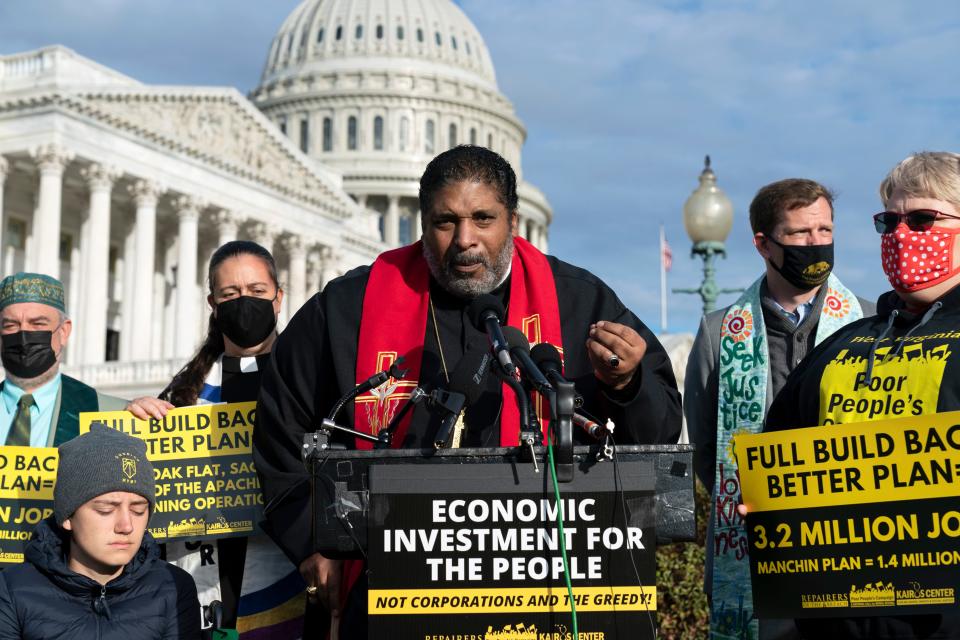Bishop William Barber on MLK's legacy, how we 'left the battlefield' in the war on poverty
- Oops!Something went wrong.Please try again later.
- Oops!Something went wrong.Please try again later.
Bishop William Barber II is a man on a mission: to end poverty in America. Not quite 60 years old — he was born two days after the 1963 March on Washington — the minister and social activist aims to complete the unfinished business of Martin Luther King Jr.
In 1967, King announced a crusade dubbed the Poor People’s Campaign. After years of fighting to end segregation — resulting in the Civil Rights Act of 1964 and the Voting Rights Act of 1965 — King focused on eliminating poverty through income and housing. The campaign launched in full force in 1968 but dissolved following his assassination.
Five and a half decades on, Barber says the nation's leaders have yet to sufficiently address poverty.
“The war on poverty was a war on which we left the battlefield; we did not finish the job, and in many ways we have regressed,” he said.
A 'hunger' to address inequities
Barber, who moved with his parents from Indianapolis to North Carolina to participate in the desegregation of that state’s public school system, got the idea to resurrect the Poor People’s Campaign during the 2016 presidential campaign.
That’s when he recognized “a hunger” to address the realities facing the country, he said. In that moment, Barber said, he knew he had to pick up the mantle and continue King’s work through “Moral Mondays” — protests that originated in North Carolina as a response to the Republican-controlled state Legislature’s attack on civil liberties.
“I grew up in a home where there was no distance or separation between Jesus and justice,” Barber said.
His organization, Repairers of the Breach, is building a grassroots movement inclusive of “low-wealth Americans” who, he said, have been ignored by both political parties for years. Barber said the group engaged more than 2 million voters across 15 states during the 2020 election cycle.
A mission embarked: North Carolina NAACP leader William Barber is stepping down to channel MLK
Barber's call to action in 2022: Poor, low-income voters can't afford to sit out this election. There's too much at stake.
The biggest difference between this Poor People’s Campaign and its predecessor lies in the ability to use data and social media to marshal activists across the nation, said the Rev. Dr. Liz Theoharis, who co-chairs the Poor People’s Campaign with Barber.
She said Barber's “insight, vision and commitment are exactly what’s needed to shift the narrative in this country about the intersection of systemic racism and poverty, and to build the power, voice, and voting power of poor and low-income people.”
President Joe Biden, Congress could have done more, Barber says
The campaign is urging Congress and President Joe Biden’s administration to take action to address systemic racism, poverty, ecological devastation and the war economy.
Barber said he knows the group’s efforts are working because of Republican actions — when they “have to suppress the vote, lie, and spend untold sums of money to win electoral office, it’s not a sign of strength, it’s a sign of weakness. They wouldn’t attack union rights, a living wage and voting rights if the movement were weak.”

Barber added that the Democratic Party is not using the full weight of its power to its advantage. He said Democrats could have passed the John R. Lewis Voting Rights Advancement Act, restoring voter protections that were gutted nine years ago by the Supreme Court. While they had control of the White House, House and Senate, Democrats also could have passed a $15-per-hour federal minimum wage and a federal bill to protect a woman’s right to choose, he said.
Barber said he’ll continue to talk about these matters until things change.
“When you’re in a moral movement you don’t quit until issues are dealt with,” he said. “You win some things, and those (struggles) you don’t win, you pass on to succeeding generations.”
This article originally appeared on USA TODAY: Bishop William Barber: reengaging the poverty fight in the name of MLK

